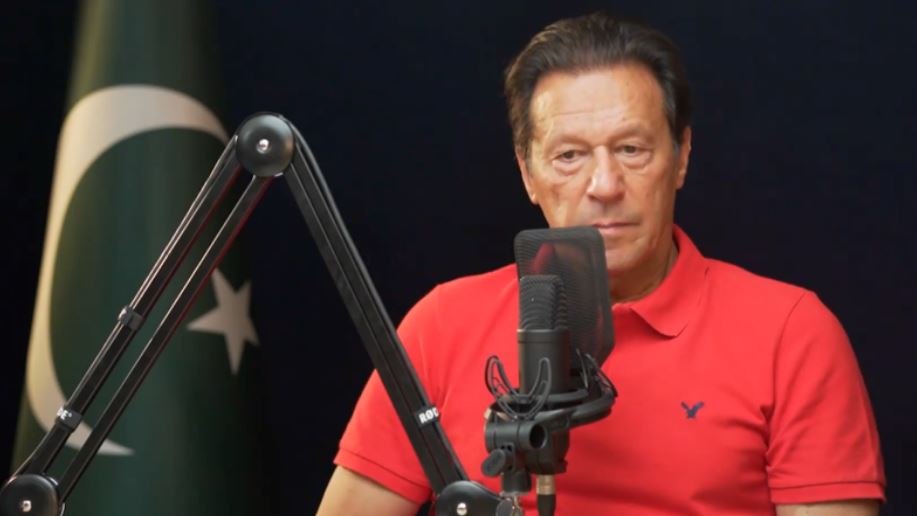ISLAMABAD: Former prime minister and PTI Chairman Imran Khan said he never wanted to bring his own army chief and that he never meddled in Pakistan Army’s affairs.
In a podcast with Junaid Akram, Muzamil Hasan and TCM Originals on Thursday night, he spoke on reports of a “disagreement” between him and Chief of Army Staff (COAS) General Qamar Javed Bajwa, particularly related to the posting of the former chief of the Inter-Services Intelligence (ISI), Lt General Faiz Hameed.
He was responding to a question by one of the hosts, who asked him “what went wrong” with the former premier’s relationship with establishment.
“Up until a few months ago we were hearing the ‘one page narrative’. So what happened all of a sudden. Was there an event that flipped things?” Talha Asad asked Imran.
“It is said that there was some unpleasantness over Gen Faiz’s appointment and [they said] he wants to make Gen Faiz the army chief. This is where it started,” Imran said.
Imran then went on to give the example of former premier Nawaz Sharif, who according to him, was controlling all institutions of the country and wanted to control the army as well by appointing his own army chief.
“I have never had an issue with army because I have never interfered [in their matters]. I never wanted to bring my own army chief. I always wanted to make the institutions of army, police and judiciary strong,” Imran went on to say.
“I had only one problem. I got to know [last summers] that there was a possibility of a civil war in Afghanistan and I was afraid that if the US left Afghanistan, it would have repercussions for Pakistan,” he said, revealing that he wanted Gen Faiz to stay during the “vulnerable winters” that followed.
The PTI chairman also said that he had started receiving news of PML-N’s campaign against him last July which was another reason why he wanted to continue with the intelligence chief, who in difficult times is the “eyes and ears” of the government.
“To date, I have never done anything against merit,” he said. “So I can’t even think of going against merit for the [appointment of] the army chief.”
Last year, reports had surfaced of an alleged standoff between the military and the government over the appointment of Lt Gen Nadeem Anjum as the new chief of the ISI.
The army had announced on Oct 6, 2021 that the former ISI chief, Lt Gen Faiz Hameed, had been appointed the Peshawar corps commander, while Lt Gen Anjum was appointed in his place. But the Prime Minister’s Office (PMO) had not issued an official notification of Lt Gen Anjum’s appointment until three weeks later, leading to frenzied speculation of strains in civil-military relations.
After delays, the PMO had eventually notified the appointment of Lt Gen Nadeem Anjum as the new ISI chief on Oct 26.
According to experts in defence matters, the procedure for appointment of the ISI director general is neither mentioned in the Constitution nor the Army Act, and all previous appointments were made as per traditions under which the army chief proposes three names to the prime minister who then makes the final decision.
‘Independent foreign policy doesn’t mean I’m anti-America’
The ex-premier, while talking about his ouster and events leading up to that, said that the sole reason behind the entire no-confidence saga was an independent foreign policy.
“But what is wrong in it? An independent foreign policy doesn’t mean we are anti-America. In fact, I would say I am not even anti-Indian. I am against the racist policies and Kashmir policies of BJP and RSS. Even in America, I had good relations with the Trump administration.”
The reason US turned “against me”, Imran said, was that he was unwilling to compromise on the policies that benefitted the 22 billion people of Pakistan.
“They [the US] wanted us to cancel the Russia trip, stop trade with them, and limit [our] relationship with China. They are asking for bases here to stop international terrorism in Afghanistan,” he continued, asserting that he would never let Pakistan sabotage itself in someone else’s war.
“They thought they could use Pakistan like a tissue paper, like they did during the war on terror,” the former PM said. “This is the number one reason why they conspired [against me] and then they found receptive people.”
Separately, in response to a question, Imran also said that he believed Pakistan should never become a part of any bloc.
During the war on terror, he recalled, Pakistan earned so much disrespect, more than 80,000 people in the country died and yet the country was never valued. “I want us to have an independent foreign policy like India. It is a strategic ally of the US but at the same time maintains good relations with Russia,” the PTI chief said.
“Why can Pakistan not do the same?” he questioned.
“America was never used to Pakistan standing up for itself so when we did, they hatched this conspiracy. And these stooges are now helping them in this.”
Subsequently, Imran rejected the commission formed by the Shehbaz government to probe the cipher which he had claimed contained evidence of the foreign conspiracy against the PTI government.
“The only commission we will accept is that of the Supreme Court, headed by the Chief Justice of Pakistan. And the condition is that an open hearing should be held on what happened from the start to the end,” he demanded.

















